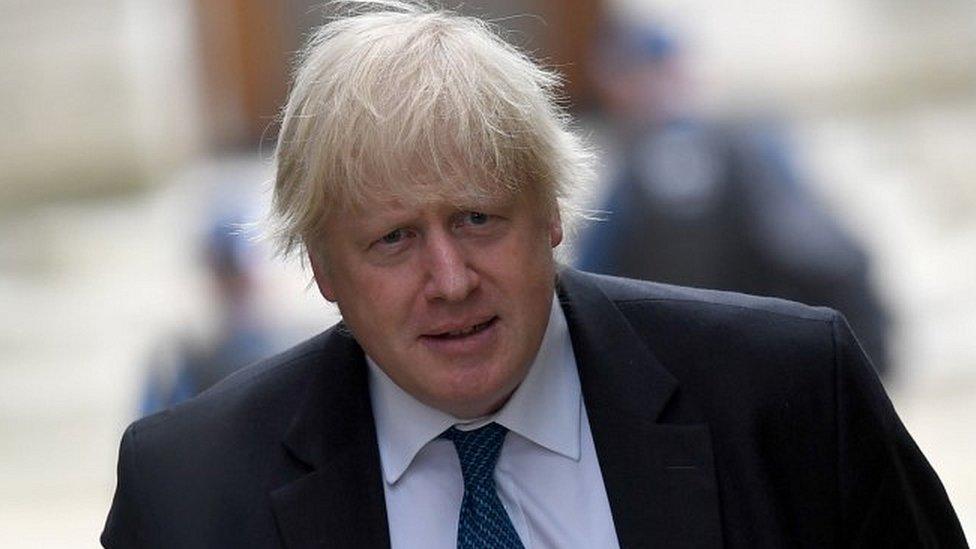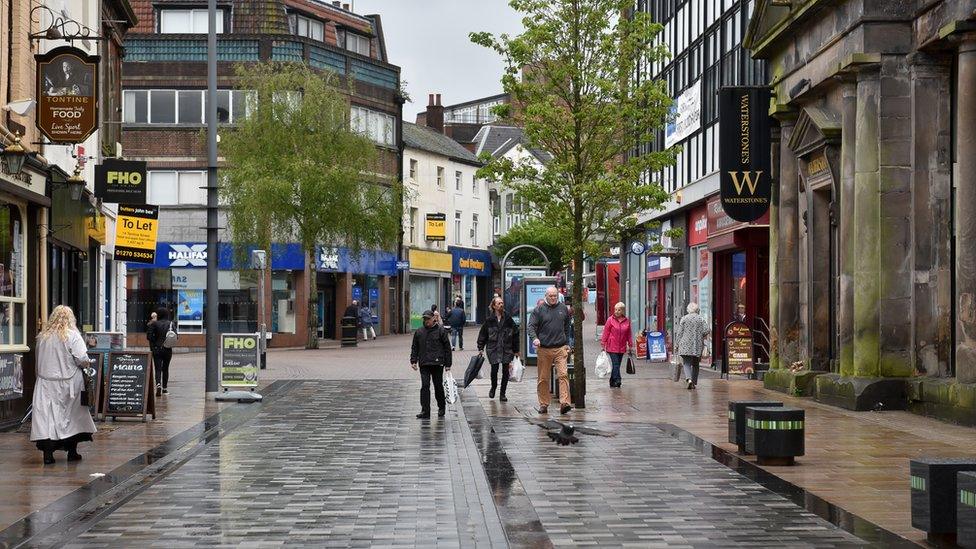Brexit: the view from the Midlands
- Published

David Davis has resigned as Brexit Secretary
Haven't I been here sometime before?
It was just four hours after Boris Johnson had followed David Davis's lead by resigning from Theresa May's Cabinet. But despite the innumerable distractions of the day, I had made it on time to my surprise, in black tie and dinner jacket, to a spectacularly decorated hall, with colourful spotlights flashing and tables, dressed with crimson cloths, ready and waiting for dinner to be served.
This was, in fact, the Chancellor's Dinner at Staffordshire University's Leek Road Campus in Stoke-on-Trent, a city famously nicknamed "Brexit Central" after voting by more than two-to-one to leave the European Union in the 2016 Referendum. As I navigated my way to my seat, it dawned on me that maybe I had been in this room sometime before.
Yes, I remembered I had first set foot there in February last year. Despite all the evening's trimmings, I realised it had been the venue from which I presented our 'live' Sunday Politics Midlands debate, during the "Brexit by-election" in Stoke Central. It was to culminate in an emphatic victory by the Labour candidate Gareth Snell, even though he had once famously compared Brexit with a pile of manure. Except he didn't call it manure.
With hindsight we can see this as the moment when it all started going wrong for UKIP. Their then leader, Paul Nuttall, had been lured by the previous year's Referendum vote in Stoke to stand here himself. After a disastrous campaign he finished third, behind not just Mr Snell but also the Conservative candidate Jack Brereton, who went on to be elected MP for Stoke South at the 'snap' general election just four months later.

Boris Johnson followed David Davis's lead by resigning from Theresa May's Cabinet
Uncanny coincidences, curious combinations of time and place, can happen in real life too, and not just in the pages of Jeffrey Archer novels.
Food for thought
I found myself sitting next to the university's deputy vice chancellor, Professor Martin Jones, a renowned authority on human geography. Patiently, he explained why it was, in fact, no accident at all that events had conspired to project Stoke into its key role in the Brexit saga. He has written a persuasive argument that it can be traced right back through events and decision-making spanning several decades, and leaving many local people with a sense of being 'left behind'.
Professor Jones is the author of an influential paper setting out the wider historical context for all this. If you want to read it in full, here it is, external.
Our conversation over dinner concentrated on events which I recall from my early career as a BBC news reporter.
Coal, steel and ceramics had guaranteed the Potteries' worldwide reputation as one of Britain's prime industrial areas until the squeeze on British steel began in the 1970s. The last steelworks at Shelton closed in 1978.
"De-industrialisation" continued during the 1980s under Mrs Thatcher's Conservative government. The rundown of the Staffordshire Coalfield began after the year-long miners' strike ended in 1985.
The ceramics industry has survived by reinventing itself in the shape of innovative firms like Steelite and Emma Bridgewater. But only after a succession of others which had failed adequately to update their products and their working methods had fallen by the wayside.
From Labour's high water mark in the 1980s and '90s, when it held all 60 seats on the city council, the party had far to fall.

Hanley is the main shopping area in the city of Stoke-on-Trent, which was famously nicknamed "Brexit Central"
Professor Jones recalled the party's habit of parachuting the likes of Mark Fisher and Tristram Hunt down from London into the city's constituencies, over and above the heads of local would-be candidates.
In 2002 the city's voters rejected Labour to elect the Independent candidate Mike Wolfe as the city's first executive mayor. Seven years later this pioneering local leadership role was emphatically dumped after a storm of protests culminated in a referendum.
Labour's presence on the council continued shrinking as the BNP and then UKIP both rose-up and fell-back. The city is run now by a combination of City Independents and Conservatives. Whoever would have thought that? The Conservatives enjoying a share of power in a city where once, under Margaret Thatcher, their name was mud. And most importantly of all, that Leave vote two years ago, in the in-out EU Referendum.
Stand back for a moment and you can see the picture that has been painted displays Stoke's "rejectionist" political landscape for all to see: even though, paradoxically, North Staffordshire has done quite well out of EU Regional Structural funding over the years!
Noises off
Digesting all this between the starter and the main course, we were regaled by one of the students crooning a Robbie Williams-style ballad and, later, between the main and the pudding, a performance by three of the university's graduands of a scene from Shakespeare's "As You Like It".
But distractions known by theatrical types as 'noises off' were vying for our attention as we tapped our iPhones furtively underneath the tables, updating us about events at Westminster. It turned out the noises in question were the cheers and desk-banging by Tory backbenchers at their meeting of the 1922 Committee. Theresa May was facing down her critics and defying speculation about a potential leadership challenge. For now.
One local MP who, we're told, remained conspicuously seated during her obligatory standing ovation was the veteran Euro-baiter, and Conservative MP for neighbouring Stone, Sir Bill Cash. He had earlier challenged the Prime Minister in the Commons: how did she reconcile her Chequers Plan with the repeal of the 1972 European Communities Act and with the re-establishment of democratic self-government here?
As the evening's entertainment drew to its close, it was clear the Tory Brexiteers were in a mood to call for the song to be changed but not the singer.
The morning after the night before

Could Bromsgrove MP Sajid Javid succeed Theresa May whenever the time comes?
By now "febrile" had established itself as the word of the week for Westminster-watchers. But it was nowhere to be heard by the time of the following morning's news programmes.
I heard Labour's Deputy Leader, the West Bromwich East MP, Tom Watson, telling BBC Radio Four's Today programme his party was prepared to "work with the Government" to help Britain secure its Brexit deal. He wasn't calling for another referendum but neither was he "taking it off the table".
So, still no end in sight to Labour "constructive ambiguity", waiting to see which way the wind blows. Local Labour MPs keep telling me privately they have no more enthusiasm for another general election than do most voters, even though the stated position of every Opposition must always be that they want one at the earliest possible opportunity.
Next, on BBC Two's Victoria Derbyshire show, the above-mentioned Sir Bill Cash was telling viewers he was not a rebel. He was merely supporting the outcome of the Referendum. Sitting next to him was his next door neighbour, Stafford's Conservative MP, Jeremy Lefroy, throwing his weight fully behind Mrs May's Chequers plan. The 'Common Rule Book' on the movement of industrial goods and agri-foods between the UK and the EU post-Brexit would protect jobs here while still enabling us to negotiate third party trade deals around the world.
So Mrs May looks safe for now. But who might succeed her whenever the time comes?
A recent survey of Tory supporters by the ConservativeHome website suggests the Bromsgrove MP Sajid Javid is their runaway favourite, with 22% of the vote. That's up from just 2% as recently as three months ago. This puts him comfortably ahead of Michael Gove, Jeremy Hunt, Boris Johnson, Jacob Rees-Mogg and Gavin Williamson.
The list of ex-future prime ministers seems to be getting longer all the time.